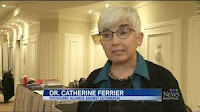Alex Schadenberg
Executive Director, Euthanasia Prevention Coalition
 |
| Alex Schadenberg |
The Quebec Commission on End-of-Life Care released it's Eighth Annual Report which indicated that there were 5211 reported euthanasia deaths (April 1, 2022 - March 31, 2023) which was up from 3663 in the previous year (April 1, 2021 - March 31, 2022). According to the data there have been 15,997 reported euthanasia deaths from legalization until March 31, 2023 in Quebec.
This represents more than a 42% increase in Québec euthanasia deaths in 2023 representing 6.8% of all Québec deaths, which is the highest in the world.
The report also indicates that from April 1 - June 30, 2023 the number of reported Québec euthanasia deaths increased by another 24%, a slower pace of growth, but substantial considering the massive number of euthanasia deaths.
 |
| Amy Hasbrouck |
When analyzing the Québec data I noticed some significant concerns. Were there 5211 Quebec euthanasia deaths or were there 5401?
Amy Hasbrouck from Toujours Vivant - Not Dead Yet, provided further analysis of the data found in the Eight Annual Report of the Québec Commission on End-of-Life care. Hasbrouck's indicates the following:
How many Euthanasia deaths?
- 5,211 MAiD reported by doctors in declaration forms (§ 3.2 p. 13)
- 5,401 euthanasia reported by hospitals and institutions (table C6 p. 46)
- 5,208 MAiD declaration forms received by the Commission (§ 2.1, p. 6)
Total euthanasia deaths since legalization?
- 15,997 Adjusted MAiD from declaration forms (figure 3.2 p. 13, Row 3) or
- 16,044 (p. 28, “Observations”)
- 18,532 Total declared by hospitals and institutions. (AR Table C6, QAR stats Row 7)
Non-compliance with the law:
- The Commission concluded that 16 people did not have a serious and incurable illness
- Some people had loss of independence due to aging,
- Others had serious symptoms, but not clear diagnosis,
- Three people had disabilities, but no serious illness, which is a requirement for Québec’s statute
- One non-compliant because doctor did not get confirmation from a second physician,
- One form was not signed by a health or social service professional,
- Two did not have valid QC health insurance. Since May 2022, the Commission no longer declares as “non-compliant” cases where the health insurance card has expired. This applied to 11 additional cases documented in the 8th annual report.
It must be noted that every year the Québec report admits to cases of non-compliance with the law. None of these cases have resulted in legal or professional actions. In August 2023, Dr. Michel
Bureau, the President of the Québec Commission on End-of-Life Care sent a letter to euthanasia doctors urging them to stop abusing the law. In that letter Bureau claimed that there were two to three euthanasia deaths each month that did not fit the criteria of the law.
The 2022 - 2023 report was not the first year with concerns. In fact, all of the reports of the Québec Commission on End-of-Life Care have contained issues.
Hasbrouck reported in her article on the 7th Annual report that:
The seventh annual report from Québec’s Commission on end of life care was filed in Québec’s National Assembly on December 9, 2022. The report covers the 2021-2022 period (April 1, 2021 to March 31, 2022).Hasbrouck stated in that article:
The Commission reported 3,663 euthanasia deaths declared by doctors during the fiscal year (p. 13), while the number of euthanasia deaths reported by facilities (3,629) and the Collège des Médecins du Québec (323) totalled 3,952 (p. 25 at note 25); a discrepancy of 289 deaths.
In light of the discrepancy (289 deaths) between the number of euthanasia reported in doctors’ declaration forms (3,663) and the facilities’/CMQ reports (3,952), and the unaccounted MAiD requests that didn’t end in euthanasia, (78 people) it’s hard to take seriously the Commission’s claim that 99.6% of euthanasia complied with the requirement of the MAiD law.
Québec is the only Canadian province that has two streams for euthanasia reporting, enabling the uncovering of under-reported euthanasia deaths. Quebec is also the only province that provides information indicating that some of the euthanasia deaths were outside of the law.
It is likely that under-reporting and non-compliance with the law exists in other provinces except that the other provinces don't have a dual reporting system and they are not analyzing the reports to determine if all of the deaths fit the criteria of the law.
For the sake of brevity, I will provide links to previous articles concerning anomalies from the Québec reports on End-of-Life Care.
Previous Quebec reports on End-of-Life Care:
- Quebec euthanasia deaths increase by 51% in 2021 - 22 annual report. A discrepancy of 289 deaths (Link).
- Quebec 2020 - 2021 annual euthanasia report. Euthanasia deaths increase by 37% unreported deaths continue (Link).





















